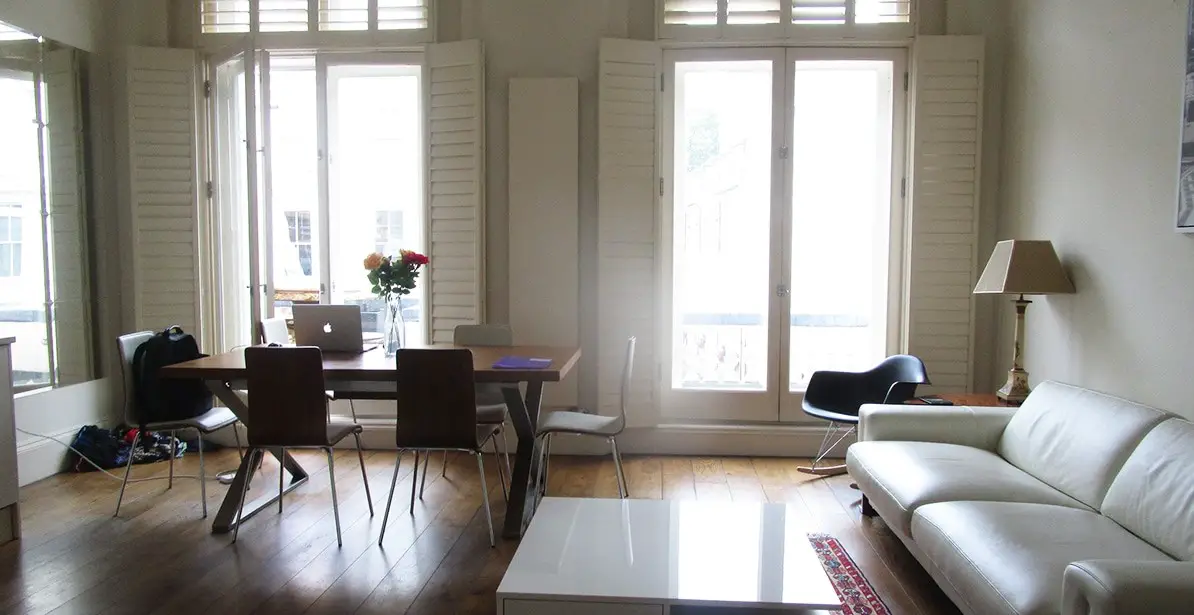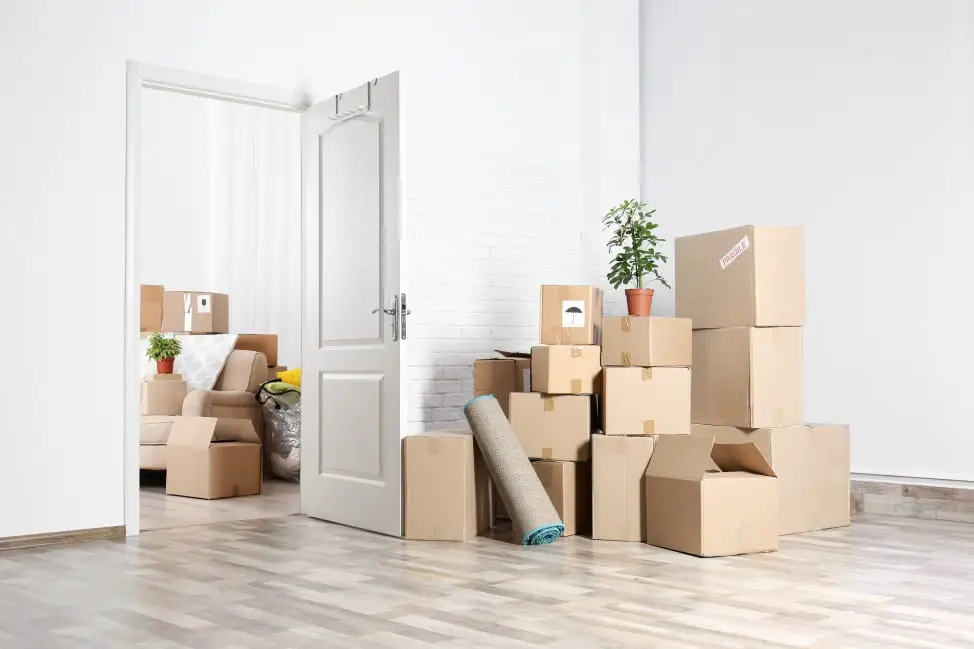If you’re wondering how much it costs to move a one-bedroom apartment, you’re not alone. Many people are in the same boat, especially if they’re moving for the first time. The cost of moving can add up quickly, so it’s important to be prepared ahead of time. The cost of moving will vary depending on the size of your move, the distance of your move, and the amount of help you have. This blog post will discuss the average cost of moving a one-bedroom apartment and provide some tips on how to save money!
What to consider when moving a One-Bedroom Apartment?

What Size Truck Do I Need for a One-Bedroom?
When moving to a one-bedroom apartment, the size truck you need will mostly depend on the number of items and furniture you have. For example, if you have a large bedroom set like a queen-sized bed frame with lots of boxes and other furniture, then an 8’ or 10’ truck would be ideal for your move.
However, if you have just a few items such as light chairs and small dressers, then a 6’ truck may suffice.
How Many U-Box Moving Containers Do I Need for a One-Bedroom?
U-Box containers are a great option for moving a one-bedroom apartment. The number of boxes you need will depend on the number of items and furniture you have, but usually, two or three U-Box containers should be enough to fit your belongings.
Additionally, it is important to make sure that all your items can fit into the box before renting them. The size of the U-Box containers ranges from 8’x5’x7.5’ to 12’x8’x8.5’, so you should be able to find a size that works for your move.
How Many Moving Boxes Do I Need for a One-Bedroom?
The number of moving boxes you need for a one-bedroom apartment will vary depending on the items and furniture you have. Generally, it is recommended to purchase around 20 small boxes, 10 medium boxes, and 6 large boxes. This should provide enough storage space for most smaller moves.
Additionally, it is important to make sure all your items can fit into the box before renting them.
How Many Movers Do I Need for a One-Bedroom Apartment?
If you are moving your one-bedroom apartment yourself, you may not need any movers at all. However, if you have heavy furniture or multiple boxes, it is always recommended to hire professional movers who can help with the loading and unloading process.
Generally, two to three movers would be enough for a one-bedroom apartment move; however, the number of movers required will depend on the number of items and furniture you have.
How to Pack a One-Bedroom Apartment

Packing your one-bedroom apartment for the move is an important part of the process. It is recommended to start packing as soon as possible so that you can get it done quickly and efficiently.
When packing your belongings, make sure to label all boxes clearly, with both their contents and destination room in the new home written on them.
Additionally, wrap delicate items individually before putting them into boxes. Lastly, make sure to pack heavier items into smaller boxes so they are easier to carry.
What Moving Supplies Do I Need for a One-Bedroom?
When moving to a one-bedroom apartment, the number of supplies you need will depend on how much stuff you have. The basic supplies you should purchase are boxes, packing tape, bubble wrap, and markers for labeling. Additionally, if you have fragile items or furniture that need to be covered, it is important to invest in blankets or shrink wrap to keep them safe during the move.
How Long Does It Take to Move a One-Bedroom?
The amount of time needed to move a one-bedroom apartment will depend on the number of items and furniture you have, as well as how organized you are. Generally, it can take anywhere from 4-6 hours to move a one-bedroom apartment, depending on the size of your truck and how many movers you have helping.
Additionally, if you plan ahead and pack in advance, this could also cut down the amount of time needed for the move [1].
What Factors Affect the Cost to Move a One-Bedroom Apartment?

The cost to move a one-bedroom apartment can vary greatly depending on several factors.
- Distance: The further you’re moving, the more expensive it will be. Long-distance moves are typically calculated by weight and/or mileage, while local moves are charged by the hour. It’s important to discuss these details with your moving company so you know what costs to expect.
- Number of Movers: Depending on how much stuff needs to be moved, you may need more than one mover or even a larger truck. This extra labor and equipment will increase the total cost of the move.
- Packing Services: If you opt for professional packing services, this will add to the total cost of your move.
- Insurance: Moving companies will often offer insurance for items that are damaged during the move, and this can also increase the total cost of your move.
- Special Services: If you need to have any special services performed such as piano moving or storage services, this will add to the overall cost of your move as well.
Ultimately, many factors can affect how much it will cost to move a one-bedroom apartment, so it’s important to discuss all these details with your moving company before you sign a contract so you know what you’re in for [2]!
Cost-saving tips for moving one bedroom apartment
Discard, Donate and Downsize
When it comes to moving a one-bedroom apartment, the most important thing is to reduce the amount of stuff you’re taking with you. The less stuff you have, the easier and cheaper it is going to be for you to move. A great way to do this is by getting rid of things that are no longer useful or that you don’t need anymore – these can be donated or thrown away.
Additionally, consider downsizing furniture, appliances, and other items so they take up less space in your new home.
Use Free Boxes or Moving Containers
Rather than buying boxes from a store or hiring out packing supplies, see if your local supermarkets are willing to give away boxes for free. Similarly, consider renting out moving containers or pods that can be packed up beforehand and stored until you’re ready to move. This is a great way to save both time and money, as you don’t need to worry about putting together boxes yourself.
Do the Packing Yourself
If possible, try to do the packing yourself. This will save you money that would have been spent on professional packers and it’s also a great way to make sure nothing is left behind or broken during the move. Make sure to label your boxes so that you know where everything goes in your new home – this will help you unpack quicker once you arrive!
Hire Movers for the Big Stuff

Although doing most of the work yourself can save you money, hiring movers for larger items like furniture and appliances is often worth it in the long run. Not only does this mean less strain on your back, but it also ensures that all of your belongings are securely packed up and transported with care. It’s also important to research different companies and compare prices before you make your decision.
Choose the Right Time to Move
Timing is everything when it comes to moving, so be sure to plan ahead and choose a time that won’t disrupt your daily life too much. The summer months are usually the busiest for movers, which means higher costs and longer wait times. Aim for late fall or early spring if possible – this way, you can avoid crowds and get better deals from moving companies.
Rent an Easily Accessible Apartment
Make sure you’re choosing an apartment that is easily accessible for movers. This means looking for ground-floor apartments or ones with elevators, as this will save time and effort during the move. It’s also important to look at parking regulations in the area so that you don’t get stuck paying hefty fees when trying to unload your items.
Plan and Prepare (Don’t Procrastinate)
The more prepared you are for your move, the easier and smoother it will be. Start packing early and make sure to create a detailed list of items that you need to take care of before the move (like canceling utility services). This will help ensure that everything runs as smoothly as possible on a moving day.
Label Everything
When loading up boxes and furniture, make sure to label them clearly so that you can easily locate them once they arrive at your new home. Additionally, consider taking pictures of all packed-up furniture or appliances so that you know exactly how they should be set up in your new home.
Hire a Top-Notch Moving Company
If you do decide to hire a moving company, make sure that they are reputable and trustworthy.

Check out customer reviews online and ask around for recommendations before committing to any one company. It’s also important to read the fine print of your contract – this will ensure that you know exactly what is included in the service so that there are no unpleasant surprises when it comes time to pay.
Move When It’s Cheapest
If you’re on a tight budget, consider moving when it’s the cheapest – typically in late summer or early fall. This is usually when the demand for movers is low, so you can often get a better deal. Additionally, look into money-saving tips like renting boxes and containers rather than buying them.
Make Sure You Have Supplies On Hand
Make sure that you have all of the supplies needed for your move on hand before you begin packing up your belongings. This includes bubble wrap, packing tape, and labeling materials (like markers). Having these items on hand will save you time and stress in the long run!
Rent a Storage Unit
If you’re feeling overwhelmed by all of the items that you have to move, consider renting a storage unit. This will give you extra space to store belongings that don’t need to be moved right away or items that won’t fit in your new home. It also means that you can take your time sorting through things and deciding what needs to stay and what needs to go [3].
FAQ
How much does a 1 bedroom local move cost?
The cost of a local 1 bedroom move varies depending on the size, weight, and distance of the move. On average, it typically costs between $200 – $500 for a short-distance move with minimal furniture and items. The cost can increase significantly if there are additional services such as packing or stairs to navigate. It’s best to contact a professional moving company for an accurate quote tailored to your needs.
How soon can I expect my belongings after a local move?
The amount of time it takes to receive your belongings after a local move depends on the size and complexity of the job. Generally speaking, most moves take about one day from start to finish; however, this could vary depending on what is being moved, the time of year, and the availability of workers. It’s best to consult with a professional moving company for an accurate timeline.
Does my move require special permits?
In some cases, your local move may require special permits due to road restrictions or parking regulations; these are typically required when moving large items such as pianos or vehicles. It’s best to consult with a professional moving company that can advise you on what is needed for a successful local move.
Do I need insurance during a local move?
The short answer is yes – it’s always recommended that you purchase insurance for your belongings before and during a local move. In most cases, professional movers will offer some form of insurance to cover any potential damage or loss of your items; however, you must read through the fine print and understand exactly what is covered and what isn’t. It’s best to consult with a professional moving company for more information.
What should I do if my belongings are damaged during a local move?
If your belongings are damaged or lost during a local move, you must contact the moving company immediately to discuss the issue and try to reach an amicable solution. If this isn’t possible, then filing a claim with their insurance provider may be necessary to receive compensation for any losses or damages resulting from the move.
Be sure to keep detailed records of all communications with the moving company as well as any documents related to the move. It’s important to note that some movers may have time limits on when claims can be filed, so it’s best to act quickly if your belongings are damaged during a local move.
How long does it take to pack a one-bedroom apartment?
The amount of time it takes to pack a one-bedroom apartment varies significantly based on the number and type of items being moved. On average, most one-bedroom apartments are packed in 1-2 days; however, this can vary depending on the size of the apartment and the amount of furniture and items that need to be moved. It’s best to contact a professional moving company for an accurate estimate tailored to your needs.
Do I need to provide packing materials for my local move?
In some cases, professional movers may require you to provide certain packing supplies such as boxes or bubble wrap; however, most will provide their own materials at an additional cost. It’s best to inquire with the moving company beforehand to find out their specific requirements.
How long should it take to move to a 2-bedroom apartment?
The amount of time it takes to move to a 2-bedroom apartment varies significantly based on the size and complexity of the job. On average, most 2-bedroom apartments are moved in 1-3 days; however, this can vary depending on the number and type of items being moved as well as any special requirements such as stairs or elevators. It’s best to contact a professional moving company for an accurate estimate tailored to your needs.
Are there any additional costs associated with a local move?
Yes, there may be additional costs associated with a local move depending on the services you require. Common fees include packing supplies, storage fees, insurance fees, and transportation fees.
Be sure to inquire with the moving company beforehand to get an accurate estimate of all fees associated with your move. It’s also important to read the fine print before signing any contract and understand exactly what is included in the price.
This will ensure that you are not surprised by any additional costs during the process of your local move.
How many square feet is a 2-bedroom apartment?
Typically, a two-bedroom apartment ranges from 800 to 1400 square feet.
However, the exact size varies depending on the layout and design of the unit. It’s best to consult with the landlord or building manager for exact measurements before signing a lease agreement.
What is the difference between a local move and a long-distance move?
The main difference between a local move and a long-distance move is that in most cases, local moves are limited to within 100 miles or less while long-distance moves involve traveling farther than 100 miles.
Additionally, long-distance moves may require additional planning due to increased travel time and costs associated with crossing state lines. It’s important to understand what type of move you need before selecting a mover as different companies may specialize in local or long-distance moves.
Ultimately, it’s best to inquire with the moving company beforehand to get an accurate quote tailored to your needs.
Useful Video: How Much Does It Cost To Move A One-Bedroom Apartment?
Conclusion
Moving a one-bedroom apartment can be a challenge for many people. It is important to plan, have adequate space for all of your belongings, and find the best deals in moving services. Having an organized list of things to do, understanding the costs associated with the move, and seeking help from professionals can make your move much easier.
Furthermore, it is important to remember that one-bedroom apartments require fewer resources than larger homes, allowing you to save money on packing supplies and transportation costs. With these tips in mind, you will be able to complete your one-bedroom move without excessive stress or hassle.
References
- https://www.movinghelp.com/move/apartment-moving-guide-one-bedroom/
- https://www.smartboxmovingandstorage.com/blog/post/smartblog/2021/03/05/the-real-cost-to-move-a-1-bedroom-apartment
- https://moving.tips/costs-saving-tips/cheapest-way-to-move-a-one-bedroom-apartment-cross-country/










Leave a Reply